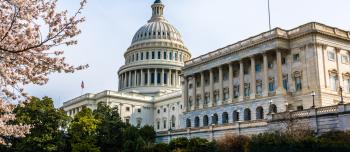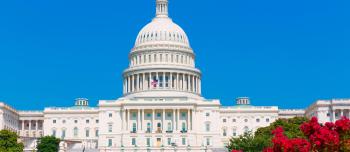On the eve of Bleeding Disorders Awareness Month, more than 400 members of the bleeding disorders community put on their red ties and traveled to Washington DC to meet with their Members of Congress and share how federal legislation and funding affects people with bleeding disorders.
The annual event, which was held February 26-28th, provides attendees with talking points, training, and leave-behind materials that ensures the volunteer advocates are united on messaging, while also allowing their personal stories of living with a bleeding disorder to enhance their asks.
The focus of this year’s event was the Hemophilia Skilled Nursing Facilities Access Act, legislation that was introduced in the Senate by Senators Bob Menendez (D-NJ), Mike Enzi (R-WY) Sheldon Whitehouse (D-RI), and in the House by Representatives Debbie Dingell (D-MI-12), Darin LaHood (R-IL-18), Brian Higgins (D-NY-26) and Gus Bilirakis (R-FL-12). The legislation would allow skilled nursing facilities (SNFs) to bill Medicare for clotting factor separately. Currently, SNF’s cannot do this, which results in people with bleeding disorders who receive Medicare being denied access to these facilities after surgery or serious bleeding episode. Volunteer advocates asked their legislators to co-sponsor the bipartisan bills.
The second request made by advocates was to maintain funding for hemophilia programs at federally funded hemophilia treatment centers and research that pertains to bleeding disorders.
“We’ve seen again and again that our community can make a big difference when they consistently represent at advocacy opportunities,” said Nathan Schaefer, vice president of public policy for NFH. “Many of our advocates come every year, and have established a productive relationship with the lawmaker and their staff.”
On Friday, attendees received training on how to advocate with their state and local governments. “That’s where the real power is,” said Schaefer. “So much of healthcare law is executed at the state level, so we really need our families to work with their chapters and go to their local advocacy days and solidify those relationships.”
For many advocates, being able to help their community through advocacy is empowering. Jodi Rudell, a volunteer advocate from Wyoming, summed it up during a meeting with staff from Senator Enzi’s office. “We are from a small state,” she said. “But I think we speak with a very loud voice.”





